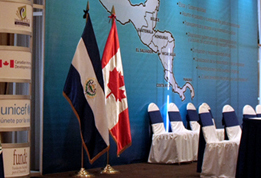 Under that sharp headline, Matthew Behrens publishes today at rabble.ca a very interesting and well documented article about the situation of Oscar Vigil and the double standard that is some times present in Canada’s immigration system.
Under that sharp headline, Matthew Behrens publishes today at rabble.ca a very interesting and well documented article about the situation of Oscar Vigil and the double standard that is some times present in Canada’s immigration system.
You can read the whole article here. These are some excerpts:
[…] Against this backdrop, two Salvadorans who refused to participate in the U.S.- and Canadian-backed terrorist regime that ruled the country during the 1980s — and who, like thousands of their fellow Salvadorans, became associated with the FMLN — are now facing a Kafkaesque immigration nightmare. At the same time as Canada recognizes the FMLN government in San Salvador, it is trying to deport long-time Canadian residents Oscar Vigil of Toronto and Jose Figueroa of Langley, B.C., because of their former membership in the FMLN, claiming it is an organization “that there are reasonable grounds to believe engages, has engaged or will engage in acts” that include “espionage,” “terrorism,” and “subversion by force of any government.” […]
[…] Oscar Vigil freely admitted in filing his 2001 Canadian refugee claim that he had been involved with opposition activities since Grade 9, and that he became media co-ordinator for the FMLN in 1988, but left in 1994. Both he and his wife, Carolina, were high-profile journalists who were subject to death threats in El Salvador. They have since lived in Toronto, raising a family and becoming deeply involved in human rights-related community activities, with Vigil’s by-line appearing frequently in the Spanish language press while he also works as executive director of the Canadian Hispanic Congress.
Although Vigil was declared inadmissible under security grounds, a 2009 pre-removal risk assessment concluded he was a person in need of protection who should not be deported, as “there is a lack of state protection for journalists or social activists in El Salvador” and that he “faces a risk to life or of cruel and unusual treatment or punishment” if returned there. A 2012 Canadian Border Services Agency (CBSA) assessment found he did not directly participate in “any combat, guerrilla or terrorist activities during his involvement with the FMLN” and further that he “does not constitute a danger to the security of Canada.” With that second positive assessment, Vigil was assured he was on the road to permanent residency and Canadian citizenship.
In 2009, Vigil also applied for ministerial relief under an exemption in the immigration act that allows humanitarian considerations to be considered in granting someone permanent residency when they have been found inadmissible on “security” grounds. But five years later, he has received no response.
Instead, in early 2014, at the same time his wife and three children were being sworn in as Canadian citizens, the Canadian government decided to ignore the positive findings of its own two assessments and ordered Vigil to be removed. In a coldly worded rejection, immigration case management officer Karine Roy-Tremblay acknowledged El Salvador is one of the 10 most dangerous countries on the planet, but sternly lectured Vigil that “it will be up to him to make the right choices to protect his security and his life.” Roy-Tremblay also rejected out of hand the disturbing re-emergence of death squads in El Salvador and numerous other Central American countries. […]
[…] Even with the FMLN in power (they won by a margin of less than 1 per cent), being deported as a national security risk would place Vigil and Figueroa on the target list of right-wing elements that continue to hold significant power in El Salvador, including powerful elite sectors of society that waged and benefitted from the brutal war against the country’s population.
These two cases no doubt make life fearful for others who fled the Salvadoran civil war, and with new legislation on tap to allow the stripping of Canadian citizenship for alleged connections to terrorism, many in the Salvadoran diaspora may wonder if they could be next, especially if they speak out on such controversial topics as Canadian mining interests (and related repression) in El Salvador and other Central American countries. […]
- Matthew Behrens is a freelance writer and social justice advocate who co-ordinates the Homes not Bombs non-violent direct action network. He has worked closely with the targets of Canadian and U.S. ‘national security’ profiling for many years.
- Read the whole article here.